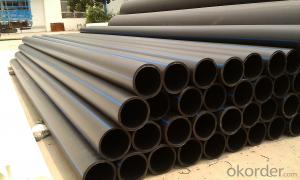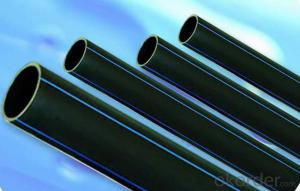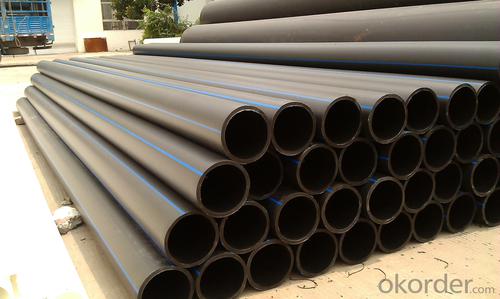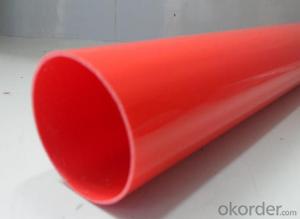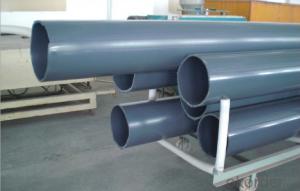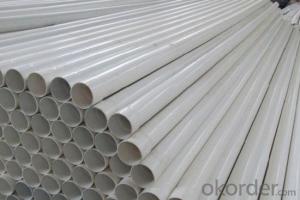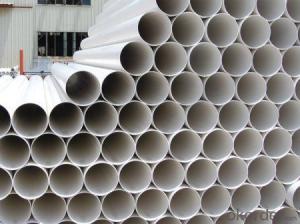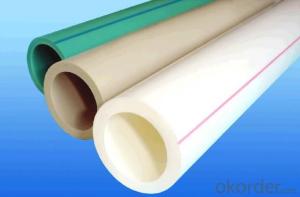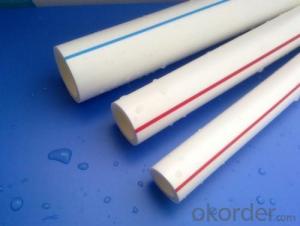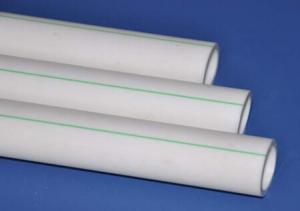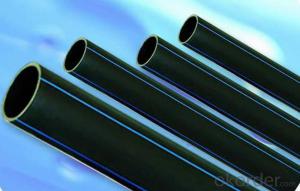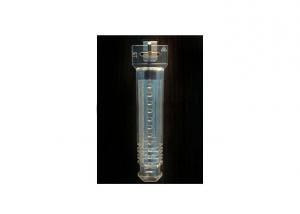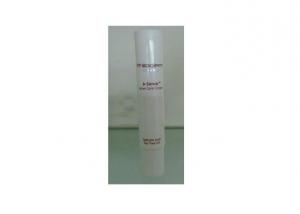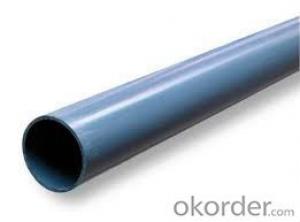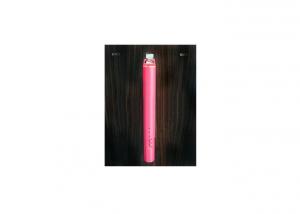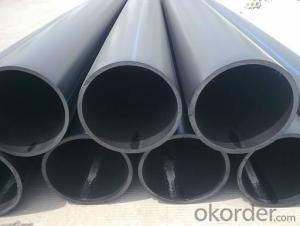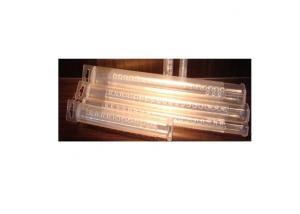HDPE Plastic Tubes ISO4427-2000 DN200
- Loading Port:
- China Main Port
- Payment Terms:
- TT OR LC
- Min Order Qty:
- -
- Supply Capability:
- -
OKorder Service Pledge
OKorder Financial Service
You Might Also Like
Physical properties[edit]
Polyethylene is a thermoplasticpolymer consisting of long hydrocarbon chains. Depending on the crystallinity and molecular weight, a melting point and glass transition may or may not be observable. The temperature at which these occur varies strongly with the type of polyethylene. For common commercial grades of medium- and high-density polyethylene the melting point is typically in the range 120 to 180 °C (248 to 356 °F). The melting point for average, commercial, low-density polyethylene is typically 105 to 115 °C (221 to 239 °F).it is transprant.
Chemical properties[edit]
Most LDPE, MDPE and HDPE grades have excellent chemical resistance, meaning that it is not attacked by strong acids or strong bases. It is also resistant to gentle oxidants and reducing agents. Polyethylene burns slowly with a blue flame having a yellow tip and gives off an odour of paraffin. The material continues burning on removal of the flame source and produces a drip.[3] Crystalline samples do not dissolve at room temperature. Polyethylene (other than cross-linked polyethylene) usually can be dissolved at elevated temperatures in aromatic hydrocarbons such as toluene or xylene, or in chlorinated solvents such as trichloroethane or trichlorobenzene.[4]
GB/T13663-2000:
| PE63管材规格 | |||||
| 公称 外径dn,mm | SDR33 | SDR26 | SDR17.6 | SDR13.6 | SDR11 |
| 公称压力 PN,Mpa | |||||
| 0.32 | 0.4 | 0.6 | 0.8 | 1.0 | |
| 公称 壁厚 | 公称 壁厚 | 公称 壁厚 | 公称 壁厚 | 公称 壁厚 | |
| 16 | 2.3 | ||||
| 20 | 2.3 | 2.3 | |||
| 25 | 2.3 | 2.3 | 2.3 | ||
| 32 | 2.3 | 2.4 | 2.9 | ||
| 40 | 2.3 | 2.3 | 3.0 | 3.7 | |
| 50 | 2.3 | 2.9 | 3.7 | 4.6 | |
| 63 | 2.3 | 2.5 | 3.6 | 4.7 | 5.8 |
| 75 | 2.3 | 2.9 | 4.3 | 5.6 | 6.8 |
| 90 | 2.8 | 3.5 | 5.1 | 6.7 | 8.2 |
| 110 | 3.4 | 4.2 | 6.3 | 8.1 | 10.0 |
| 125 | 3.9 | 4.8 | 7.1 | 9.2 | 11.4 |
| 140 | 4.3 | 5.4 | 8.0 | 10.3 | 12.7 |
| 160 | 4.9 | 6.2 | 9.1 | 11.8 | 14.6 |
| 180 | 5.5 | 6.9 | 10.2 | 13.3 | 16.4 |
| 200 | 6.2 | 7.7 | 11.4 | 14.7 | 18.2 |
| 225 | 6.9 | 8.6 | 12.8 | 16.6 | 20.5 |
| 250 | 7.7 | 9.6 | 14.2 | 18.4 | 22.7 |
| 280 | 8.6 | 10.7 | 15.9 | 20.6 | 25.4 |
| 315 | 9.7 | 12.1 | 17.9 | 23.2 | 28.6 |
| 355 | 10.9 | 13.6 | 20.1 | 26.1 | 32.2 |
| 400 | 12.3 | 15.3 | 22.7 | 29.4 | 36.3 |
| 450 | 13.8 | 17.2 | 25.5 | 33.1 | 40.9 |
| 500 | 15.3 | 19.1 | 28.3 | 36.8 | 45.4 |
| 560 | 17.2 | 21.4 | 31.7 | 41.2 | 50.8 |
| 630 | 19.3 | 24.1 | 35.7 | 46.3 | 57.2 |
- Q: it comes this plastic tube (it isn't in the pic) but i have no idea where it goes or what is it for?
- Does the tube you're referring to have a little hole in it? If so it's for hooking up an airline to help oxygenate the water.
- Q: Are plastic tubes suitable for use in the oil and gas industry?
- Yes, plastic tubes are suitable for use in the oil and gas industry. They offer numerous advantages such as resistance to corrosion, chemicals, and high pressure. Plastic tubes are lightweight, durable, and easy to install, reducing both costs and maintenance requirements. Additionally, they allow for better flow rates and are compatible with various fluids and gases used in the industry.
- Q: If you have a CPAP machine with a nasal mask, and it is new, does the smell of the plastic make you feel ill? Anyone have this experience, and what did you do about it ?
- Yes it does smell at first, but it goes away with time, especially after a few washings. I actually like the smell now when I get a new mask, maybe because I know it's new.:)
- Q: Can plastic tubes be used for storing art supplies or materials?
- Yes, plastic tubes can be used for storing art supplies or materials. They provide a secure and organized way to store various items such as paintbrushes, pencils, pens, markers, and small art tools. Plastic tubes also help protect these supplies from damage, dust, and moisture.
- Q: Glass surfaces are negatively charged, and when blood is collected in a clean glass test tube, it clots. Explain this observation.
- it doesnt matter if it's glass or plastic. Once exposed to air (oxygen) the blood will clot unless it's been treated with an anticoagulant like EDTA, heparin, or sodium citrate. That's why these test tubes have anti coagulant in them. The tubes themselves can be glass or plastic, it doesn't matter. No anti-coagulant = clot anti-coagulant = no clot.
- Q: What are the advantages of using plastic tubes in the electrical packaging industry?
- There are several advantages of using plastic tubes in the electrical packaging industry. Firstly, plastic tubes are lightweight, making them easy to transport and handle. Secondly, they provide excellent insulation properties, protecting electrical components from damage and ensuring safety. Additionally, plastic tubes are durable and resistant to corrosion and moisture, making them suitable for various environments. They are also cost-effective compared to other materials, allowing for lower production costs. Lastly, plastic tubes can be easily customized in terms of size, shape, and color, providing flexibility in design and meeting specific packaging requirements.
- Q: Can plastic tubes be used for pharmaceutical packaging?
- Yes, plastic tubes can be used for pharmaceutical packaging. They are commonly used for packaging creams, ointments, gels, and other semi-solid products. Plastic tubes offer advantages such as easy dispensing, precise dosage control, and protection against contaminants.
- Q: I am doing a school project and i need to get my hands on some surgical tubing. i don't know ware to buy it however can somebody please help me???????
- Find a lowes or Home depot near you and go to the plumbing section where they sell hoses by the foot. Most carry the latex tubing your looking for. I just passed right by a roll of the stuff earlier when i was there.
- Q: Are plastic tubes suitable for laboratory use?
- Yes, plastic tubes are suitable for laboratory use. They are commonly used in various laboratory applications such as storing and transporting samples, as well as for centrifugation and other types of experiments. Plastic tubes are lightweight, durable, and resistant to many chemicals, making them a practical and cost-effective option for laboratory use.
- Q: Are plastic tubes resistant to solvents?
- Yes, plastic tubes are generally resistant to solvents.
Send your message to us
HDPE Plastic Tubes ISO4427-2000 DN200
- Loading Port:
- China Main Port
- Payment Terms:
- TT OR LC
- Min Order Qty:
- -
- Supply Capability:
- -
OKorder Service Pledge
OKorder Financial Service
Similar products
Hot products
Hot Searches
Related keywords
